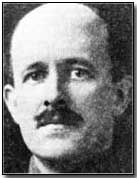Who's Who - Maurice Hankey
 Maurice Hankey (1877-1963)
effectively instigated Cabinet government as it is recognised today during
his long tenure as secretary of the War Cabinet (and subsequently of the
regular Cabinet).
Maurice Hankey (1877-1963)
effectively instigated Cabinet government as it is recognised today during
his long tenure as secretary of the War Cabinet (and subsequently of the
regular Cabinet).
Hankey was born in Biarritz in 1877 and educated at Rugby School before receiving a commission into the Royal Marine Artillery in 1895. Remaining in the RMA until 1901 he was recruited the following year into naval intelligence. He eventually rose to become Secretary of the Navy.
In 1908 Hankey moved from the Royal Marines to become Assistant Secretary to the Committee of Imperial Defence (CID), established in 1902 by then Prime Minister Arthur Balfour (who later became a firm friend of Hankey).
The purpose of the CID was to co-ordinate strategy and defence planning; although it signally failed in this capacity it was through no fault of Hankey. Rising to become its Secretary in 1912 Hankey retained the post until his retirement in 1938.
With the CID chaired by the Prime Minister of the day, each holder of that officer came to realise and then depend upon Hankey's capacity for the necessary minutiae of Cabinet government, not to mention his outstanding organisational talents.
The CID was not in fact called upon a great deal once war arrived in August 1914; nevertheless its Secretary, Hankey, served on numerous ad hoc committees, the War Council and the Dardanelles Committee. A man of ideas, Hankey was instrumental in championing the development of the tank in 1914.
Hankey was retained with the arrival of David Lloyd George as Prime Minister (succeeding Asquith) and was appointed by the latter as Secretary of the War Cabinet (where he remained until its dissolution with the armistice). With war over he remained Secretary of the Cabinet until his eventual retirement in 1938.
Despite his nominal retirement in 1938 he was recalled at the outbreak of World War Two as minister without portfolio in the War Cabinet. Once Churchill finally took office as Prime Minister he appointed his former colleague as Paymaster General (1941-42).
Hankey published numerous books, including Government Control in War (1945) and The Supreme Command, 1914-1918 (1961). He died in 1963.
"Bully Beef" comprised cans of boiled or pickled beef used by the British Army.
- Did you know?
